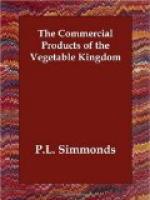* * * * *
M. Guillemin concludes his interesting narration with this partially discouraging fact;—that though the culture of the tea-shrub succeeds perfectly well in Brazil; though the gathering of the foliage proceeds with hardly any interruption during the entire year; though the quality (setting aside the aroma, which is believed to be artificially added) is not inferior to that of the finest tea from China—still the growers have not realised any large profits. They have manufactured an immense quantity of tea, to judge by what he saw in the warehouses at St. Paul, but they cannot afford to sell it under six francs for the half kilogramme (a pound weight), which is higher than Chinese tea of equally good quality. This is, however, precisely one of those commodities in which free labour, that is, the labor of a free peasant’s family, the wife and children, the young and the old, can successfully compete with slave labor, and considerably undersell it. It is manifest, from the remarks of M. Guillemin, that the cost for plantation slaves, under a system apparently so profitable as labor without wages, is a dead weight on the Brazilian planter.”
Paraguay Tea.—A species of holly (Ilex Paraguensis), which grows spontaneously in the forest regions of Paraguay, and the interior of South America, furnishes the celebrated beverage called Yerba Mate, in South America. The evergreen leaf of this plant is from four to five inches long; when prepared for use as tea it is reduced to powder, and hence the decoction has to be quaffed by means of a tube with a bulb perforated with small holes.
The leaves yield the same bitter principle called theine, which is found in the leaf of the Chinese tea-plant, the coffee berry, &c. Various other species of Ilex are sometimes employed in other parts of South America for a similar purpose. Although the leaves may not contain as much of the agreeable narcotic oil as those of the China shrub, in consequence of the rude way in which it is collected and prepared for use, yet it is much relished by European travellers in South America, and would doubtless enter largely into consumption if imported into this country at a moderate rate of duty.
The consumption in the various South American Republics is estimated at thirty or forty millions of pounds annually. It is generally drank without sugar or milk.
There are no correct data for calculating the exports, but some authorities state the amount sent to Santa Fe and Buenos Ayres at eight millions of pounds.




